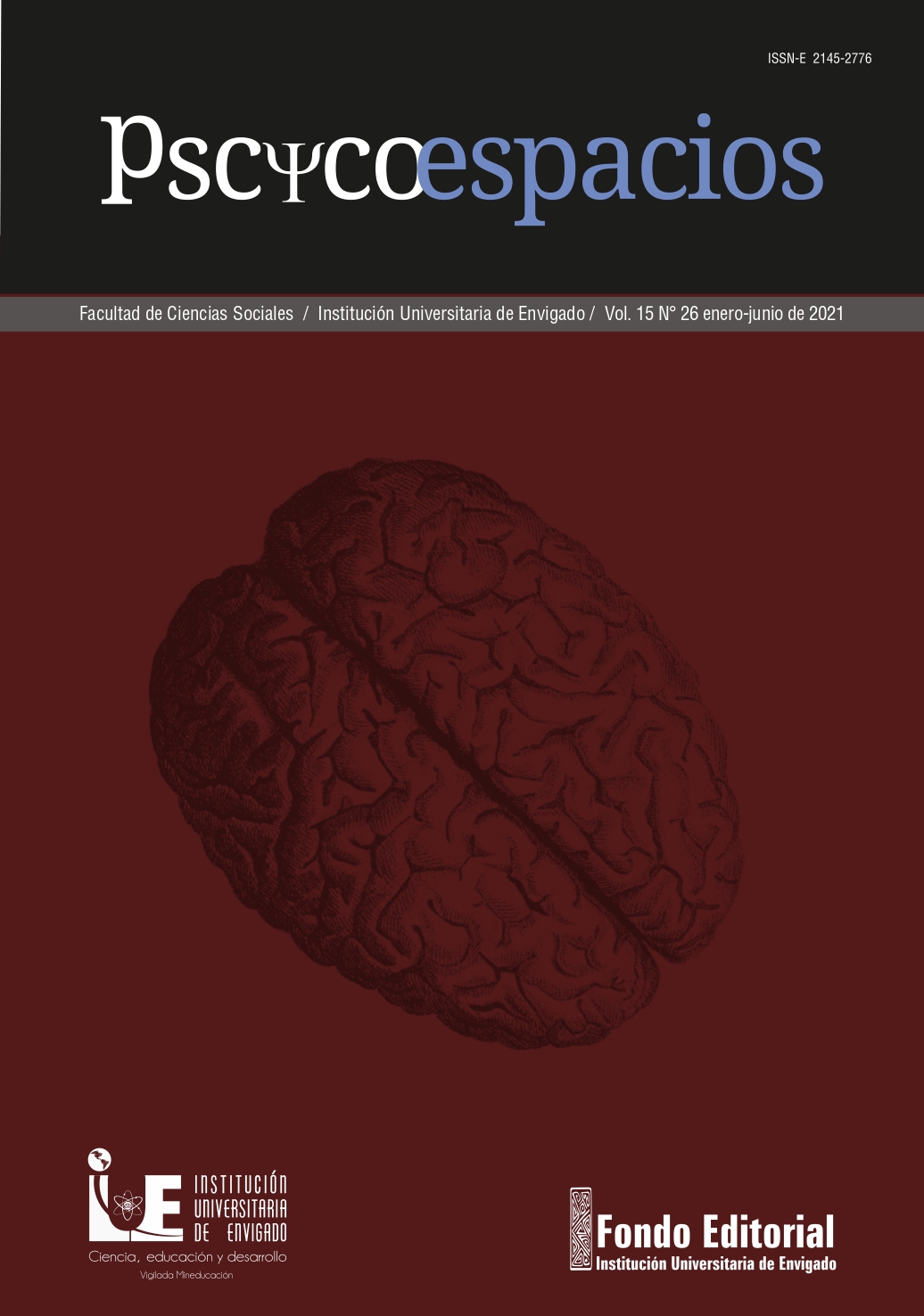Neuropsychological assessment in confabulatory states
DOI:
https://doi.org/10.25057/21452776.1405Keywords:
cognitive processes, evaluation of cognitive processes, confabulation, memory, neuropsychological evaluation in confabulationAbstract
The confabulation responds to failures to recognize the chronological order of the stored information, to inhibit some responses, to monitor behavior, benefit from foreign keys with apparent anosognosia of those who suffer from it, which has been related to both memory failures and executive functions. This can be evidenced by means of different specific memory tests and/or other neuropsychological tests frequently used. Objective: To know the presentations, etiology and neuroanatomical correlates of confabulation and its behavior through different neuropsychological evaluation protocols. Methodology: Descriptive review carried out through which information of no more than 5 years (from 2015 to 2020) was filtered through databases such as: Google Scholar, Redalyc.Org, Researcher - app, Pub Med and Scielo, Results: About 50 articles from recent publications were found in which confabulation was the axis of study, or at least was involved in the inclusion criteria of the studies carried out. Conclusions: Confabulation has become a heterogeneous phenomenon. In terms of classification, it would seem more practical and would provide more information the order form suggested by Schnider for confabulation in its four aspects. The etiology of the confabulation is not exclusive to frontal lobe or orbitofrontal damage and it is presumed that the executive function tests used in neuropsychology do not have sufficient sensitivity to reveal the specific frontal dysfunction underlying the confabulations as the tests of memory do.
Author Biography
Juan Carlos Ortiz Valencia, Neuropsicólogo
Mg. Neuropsicología.
References
Ardila, A., Arocho Llantín, J. L., Labos, E. y Rodríguez Irizarry, W. (2015). Diccionario de Neuropsicología. https://www.researchgate.net/publication/268926205_Diccionario_de_Neuropsicologia.
Bajo, A., Fleminger, S., Metcalfe, C. y Kopelman, M. D. (2016). Confabulation: What is associated with its rise and fall? A study in brain injury. Cortex, 87, 31-43. https://doi.org/10.1016/j.cortex.2016.06.016
Bergamin, J. A. (2018). An Excess of Meaning: Conceptual Over-Interpretation in Confabulation and Schizophrenia. Topoi, 39, 163-176. https://doi.org/10.1007/s11245-018-9609-6
Bernecker, S. (2017). A causal theory of mnemonic confabulation. Frontiers in Psychology, 8, 1-14. https://doi.org/10.3389/fpsyg.2017.01207
Brewin, C. R. (2018). Memory and forgetting. Current Psychiatry Reports, 20(87), 1-8. https://doi.org/10.1007/s11920-018-0950-7
Celis-López, E., Herrera-Meza, G., Peredo-Rivera, E., Sánchez-García, Á. J., Rebolledo-Hernández, D., Golubov, J. y Martínez-Chacón, A. J. (2018). Evaluación de la memoria emocional después de una prueba Stroop en estudiantes universitarios con estrés académico. Eduscientia, 1(1), 30-44. https://eduscientia.com/index.php/journal/article/view/3
Chan, E., Paterson, H. M. y van Golde, C. (2019). The effects of repeatedly recalling a traumatic event on eyewitness memory and suggestibility. Memory, 27(4), 536-547. https://doi.org/10.1080/09658211.2018.1533563
Christensen, J. N. y Sørensen, T. A. (2019). Confabulation Resilience of the Developing Brain: A Brief Review. Journal of the International Neuropsychological Society, 25(4), 426-431. https://doi.org/10.1017/S1355617719000134
Coltheart, M. (2016). Confabulation and conversation. Cortex, 87, 62-68 https://doi.org/10.1016/j.cortex.2016.08.002
Dalla Barba, G., Brazzarola, M., Barbera, C., Marangoni, S., Causin, F., Bartolomeo, P. y Thiebaut de Schotten, M. (2018). Different patterns of confabulation in left visuo-spatial neglect. Experimental Brain Research, 236(7), 2037-2046. https://doi.org/10.1007/s00221-018-5281-8
Dalla Barba, G., Brazzarola, M., Marangoni, S. y Alderighi, M. (2020). Confabulation affecting Temporal Consciousness significantly more than Knowing Consciousness. Neuropsychologia, 140, 33. https://doi.org/10.1016/j.neuropsychologia.2020.107367
Dalla Barba, G., Brazzarola, M., Marangoni, S., Barbera, C. y Zannoni, I. (2017). A longitudinal study of confabulation. Cortex, 87, 44-51. https://doi.org/10.1016/j.cortex.2016.05.009
Dalla Barba, G., Brazzarola, M., Marangoni, S. y La Corte, V. (2018). Screening for confabulations with the confabulation screen. Neuropsychological Rehabilitation, 30(1), 116-129. https://doi.org/10.1080/09602011.2018.1464475
Dalla Barba, G., Guerin, B., Brazzarola, M., Marangoni, S., Barbera, C. y La Corte, V. (2018). The confabulation battery: Instructions and international data from normal participants. Neuropsychological Rehabilitation, 29(10), 1625-1636. https://doi.org/10.1080/09602011.2018.1436446
Fujikawa, M., Nishio, Y., Kakisaka, Y., Ogawa, N., Iwasaki, M. y Nakasato, N. (2016). Fantastic confabulation in right frontal lobe epilepsy. Epilepsy and Behavior Case Reports, 6, 55-57. https://doi.org/10.1016/j.ebcr.2016.08.003
Fustinoni, O. (2016). Semiología del Sistema Nervioso de Fustinoni (15.a ed.). Editorial El Ateneo.
Galaburda, A. M. y Wong, B. (2017). Neuropsicología: mirando hacia adelante. Panamerican Journal of Neuropsychology, 11(2), 1-5.
García Barco, M. A. (2020). La evaluación neuropsicológica como herramienta en el diagnóstico de pacientes simuladores. HAL, 1-17. https://hal.archives-ouvertes.fr/hal-02523954/document
González Viéitez, G. (2019). Relación entre recuerdo demorado en la Figura Compleja de Rey-Osterrieth y funcionamiento ejecutivo. European Journal of Investigation in Health, Psychology and Education, 9(1), 5-18. https://doi.org/10.30552/ejihpe.v9i1.312
González López, I., Sierra Benítez, E. M., León Pérez, M. Q., Figueroa García, E. M., Aguilera Hernández, A. y Olivera Manzano, L. U. (2017). Psicosis de Korsakoff, a propósito de un caso interesante. Revista Médica Electrónica, 39(1), 772-780.
Green, D. y Loprinzi, P. D. (2019). Experimental Effects of Acute Exercise on Prospective Memory and False Memory. Psychological Reports, 122(4), 1313-1326. https://doi.org/10.1177/0033294118782466
Gudjonsson, G. (2016). Memory distrust syndrome, confabulation and false confession. Cortex, (87), 156-165. https://doi.org/10.1016/j.cortex.2016.06.013
Huertas-Hoyas, E., Pedrero-Pérez, E. J., Martínez-Campos, M. y Laselle-López, M. (2016). Inventario de síntomas prefrontales (ISP) en el daño cerebral adquirido: concordancia entre puntuaciones de paciente, familiar y profesional. Revista de Neurologia, 63(9), 385-392. https://doi.org/10.33588/rn.6309.2016323
Ichino, A. (2018). Superstitious Confabulations. Topoi, (39), 203-217. https://doi.org/10.1007/s11245-018-9620-y
Juárez-Pérez, C. A., Aguilar-Madrid, G., Sandoval-Ocaña, J., Cabello-López, A., Trujillo-Reyes, O., Madrigal-Esquivel, C. y Wesseling, C. (2019). Neuropsychological effects among workers exposed to organic solvents. Salud Pública de México, 61(5), 670-677. https://doi.org/10.21149/9800
Kantzios, I. (2019). Memory and forgetfulness in alcaeus. Classical Philology, 114(3), 322-343. https://doi.org/10.1086/703683
Kopelman, M. D. (2019). Anomalies of Autobiographical Memory. Journal of the International Neuropsychological Society, 25(10), 1061-1075. https://doi.org/10.1017/S135561771900081X
Lim, S.-J., Wöstmann, M., Geweke, F. y Obleser, J. (2018). The benefit of attention-to-memory depends on the interplay of memory capacity and memory load. Frontiers in Psychology, 9(184), 1-11. https://doi.org/10.3389/fpsyg.2018.00184
Liverani, M. C., Manuel, A. L., Guggisberg, A. G., Nahum, L. y Schnider, A. (2016). No influence of positive emotion on orbitofrontal reality filtering: Relevance for confabulation. Frontiers in Behavioral Neuroscience, 10(98), 1-9. https://doi.org/10.3389/fnbeh.2016.00098
Mandich, V. C., Custodio, J. y Sánchez Negrete, M. G. (2016). Errores en memoria episódica verbal y quejas mnésicas. VIII Congreso Internacional de Investigación y Práctica Profesional en Psicología XXIII Jornadas de Investigación XII. Encuentro de Investigadores en Psicología del MERCOSUR. Facultad de Psicología, Universidad de Buenos Aires. Buenos Aires, Argentina.
Marschall, S. (2018). Memory work versus memory-work and its utility in heritage tourism. Current Issues in Tourism, 22(14), 1659-1669. https://doi.org/10.1080/13683500.2018.1544230
Martín Juan, A., Madrigal, R., Porta Etessam, J., Sáenz-Francés San Baldomero, F. y Santos Bueso, E. (2018). Ceguera de Anton-Babinski, a propósito de un caso. Archivos de La Sociedad Española de Oftalmología, 93(11), 555-557. https://doi.org/10.1016/j.oftal.2018.04.004
McLachlan, E., Rai, S., Al-Shihabi, A., Huntley, J., Burgess, N., Howard, R. y Reeves, S. (2019). Neuroimaging correlates of false memory in ’Alzheimer’s disease: A preliminary systematic review. Psychiatry Research: Neuroimaging, 269, 1 - 30. https://doi.org/10.1016/j.pscychresns.2019.111021
Mendez, M. F. (2019). Frontolimbic affective bias and false narratives from brain disease. Medical Hypotheses, 128, 13-16. https://doi.org/10.1016/j.mehy.2019.04.020
Molina, M. (2016). El rol de la evaluación neuropsicológica en el diagnóstico y en el seguimiento de las demencias. Revista Médica Clínica Las Condes, 27(3), 319-331. https://doi.org/10.1016/j.rmclc.2016.06.006
Norris, D. (2017). Short-term memory and long-term memory are still different. Psychological Bulletin, 143(9), 992-1009. https://doi.org/10.1037/bul0000108
Ospina-García, N., Román, G. C., Pascual, B., Schwartz, M. R. y Preti, H. A. (2018). Hypothalamic relapse of a cardiac large B-cell lymphoma presenting with memory loss, confabulation, alexia-agraphia, apathy, hypersomnia, appetite disturbances and diabetes insipidus. BMJ Case Reports, 1-7. https://doi.org/10.1136/bcr-2016-217700
Rensen, Y. C. M., Oosterman, J. M., Walvoort, S. J. W., Eling, P. A. T. M. y Kessels, R. P. C. (2016). Intrusions and provoked and spontaneous confabulations on memory tests in Korsakoff’s syndrome. Journal of Clinical and Experimental Neuropsychology, 39(2), 101-111. https://doi.org/10.1080/13803395.2016.1204991
Rensen, Y. C. M., Oosterman, J. M., van Damme, J. E., Griekspoor, S. I. A., Wester, A. J., Kopelman, M. D. y Kessels, R. P. C. (2015). Assessment of confabulation in patients with alcohol-related cognitive disorders: The Nijmegen-Venray confabulation list (nvcl-20). The Clinical Neuropsychologist, 29(6), 804-823. https://doi.org/10.1080/13854046.2015.1084377
Rensen, Y. C. M., Oudman, E., Oosterman, J. M. y Kessels, R. P. C. (2020). Confabulations in Alcoholic Korsakoff’s Syndrome: A Factor Analysis of the Nijmegen–Venray Confabulation List. Assessment, (11), 1-11. https://doi.org/10.1177/1073191119899476
Ríos-Flórez, J. A. y López-Gutiérrez, C. R. (2018). El rol de la neuropsicología y la interdisciplinariedad en la etiología y neurofuncionalidad del Déficit de Atención e Hiperactividad. Psicoespacios, 12(20), 73-93. http://revistas.iue.edu.co/revistasiue/index.php/Psicoespacios/article/view/992/1304
Robins, S. (2018). Mnemonic Confabulation. Topoi, 39, 121-132. https://doi.org/10.1007/s11245-018-9613-x
Schnider, A., Nahum, L. y Ptak, R. (2016). What does extinction have to do with confabulation? Cortex, 87, 5-15. https://doi.org/10.1016/j.cortex.2016.10.015
Shingaki, H., Park, P., Ueda, K., Murai, T. y Tsukiura, T. (2015). Disturbance of time orientation, attention, and verbal memory in amnesic patients with confabulation. Journal of Clinical and Experimental Neuropsychology, 38(2), 171-182. https://doi.org/10.1080/13803395.2015.1094027
Spitzer, D., White, S. J., Mandy, W. y Burgess, P. W. (2016). Confabulation in children with autism. Cortex, 87, 80-95. https://doi.org/10.1016/j.cortex.2016.10.004
Tagai, K., Nagata, T., Shinagawa, S. y Shigeta, M. (2020). Anosognosia in patients with Alzheimer’s disease: current perspectives. Psychogeriatrics, 20(3), 345-352. https://doi.org/10.1111/psyg.12507
Tapia Guerrero, A., García Gutiérrez, G., Rodríguez Molina, A., Peñuela Ruiz, L., García Gallardo, M. y Aguilar Cuevas, R. (2018). Lo que el radiólogo debe saber sobre el infarto de la arteria de Percherón. Sociedad Española de Radiología Médica. https://piper.espacio-seram.com/index.php/seram/article/view/1457
Terranova, J. I., Ogawa, S. K. y Kitamura, T. (2019). Adult hippocampal neurogenesis for systems consolidation of memory. Behavioural Brain Research, 372, 1 - 7. https://doi.org/10.1016/j.bbr.2019.112035
Turnbull, O. H. y Salas, C. E. (2016). Confabulation: Developing the ‘emotion dysregulation’ hypothesis. Cortex, 87, 52-61. https://doi.org/10.1016/j.cortex.2016.09.024
Voss, M. W., Soto, C., Yoo, S., Sodoma, M., Vivar, C. y van Praag, H. (2019). Exercise and Hippocampal Memory Systems. Trends in Cognitive Sciences, 23(4), 318-333. https://doi.org/10.1016/j.tics.2019.01.006
Zoladz, P. R., Cadle, C. E., Dailey, A. M., Fiely, M. K., Peters, D. M., Nagle, H. E., Mosley B. E., Scharf A. R., Brown C. M., Duffy T. J., Earley M. B., Rorabaugh B. R. y Payment, K. E. (2017). Blunted cortisol response to acute pre-learning stress prevents misinformation effect in a forced confabulation paradigm. Hormones and Behavior, 93, 1-8. https://doi.org/10.1016/j.yhbeh.2017.04.003
How to Cite
Downloads
Published
Issue
Section
License
Copyright (c) 2021 Institución Universitaria de Envigado

This work is licensed under a Creative Commons Attribution-NonCommercial-ShareAlike 4.0 International License.

| Article metrics | |
|---|---|
| Abstract views | |
| Galley vies | |
| PDF Views | |
| HTML views | |
| Other views | |




